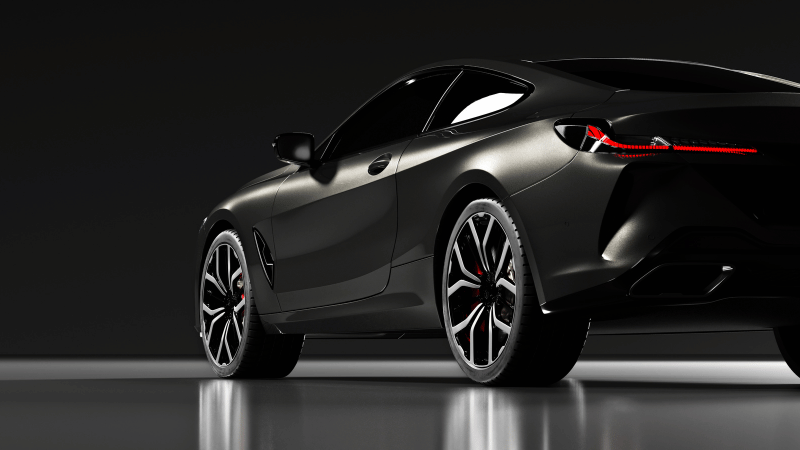How Does Car Finance Actually Work?
Cars are expensive. For the majority of people in the UK, buying a car is the second most expensive lifetime purchase, beaten only by a house.
There’s little that can be done about it - cars are large, complicated, and pretty much essential to modern life - but that doesn’t mean they’re easy to afford - far from it.
Car finance plays a key role in making car ownership a possibility for most people, and without it, the whole automobile industry would collapse.
*Note: minimum loan size of £50,000 for individuals, and £25,000 for business purchases
Car finance occurs at every stage of the car’s lifespan. When a car is new, few people simply fork out the cash to buy one outright, and leasing options become the manufacturer's way to get these exciting-but-expensive vehicles out into the world.
A few years later, those cars enter the used car market, where hire purchase and other financing gives people a means to buy them for the long term.
Later still, they are part exchanged and sold on again, forming a further layer of car purchase suitable for younger people getting their first cars, with reliance on smaller car loans or more affordable cash purchases.
Simply put, a car bought on finance is always more expensive than one bought for cash. However, spreading the payments in a way that you can actually afford makes car finance essential for many, and a good financial option even for those who do have the capital available - leaving them with the cash in the bank for other uses and investment opportunities.
Not only that, but depending on the car finance option, it may come with other benefits, such as maintenance, breakdown support, and the enticing ability to upgrade or switch your car more frequently when new models are released and new technologies become available.
The 5 Main Types of Car Finance
The main 5 types of car finance are:
- Hire Purchase (HP)
- An Unsecured Personal Loan
- Personal Contract Purchase (PCP)
- Personal Contract Hire (PCH)
- Credit Cards as Car Finance
Above that, car finance is also split into personal and business. There’s a lot of crossover between the two, but they are tailored to fit slightly different needs, so it’s important to understand that there are differences.
We will look into both types of finance in this guide; for now it’s enough to keep in mind that the options for one may not exist for the other, and even products with a similar name may have slight differences.
The following 5 product types have all been designed with the individual in mind. In these cases, the responsibility of the car and the repayments are yours directly. When taking out personal car finance, your credit history will be checked and will affect the success of your application - credit checks like this are the primary way the finance company assesses their risk.
We provide an example scenario for each product, so you can see exactly how they compare. Here's a quick preview of our comparison table based on the example we provide throughout:
Hire Purchase (HP)
Hire purchase is one of the most popular forms of car finance.
HP allows you to finance pretty much any car. Whereas with leasing you have to choose from the cars on offer by the leasing company; with hire purchase, you can find the car you like first, and then get a hire purchase agreement to pay for it.
Hire purchase, however, is not exactly the same as a loan - though it feels and works in a very similar fashion.
With hire purchase, you don’t own the car until you have paid off the entire agreement. Instead, the finance company essentially purchases the vehicle on your behalf and you hire it from them (thus the name) under the agreement that once it’s all paid, you own it in full.
The finance company owns the car, which provides security for them. If you don’t pay your monthly agreement, they can repossess the vehicle easily.
Compare this to an unsecured loan used to buy a car - if you don’t repay the bank in this instance, they can’t touch your car. This is why hire purchase finance has better rates than a similar unsecured personal loan - by mitigating some of the risk, the finance company is happier to offer a superior deal. However, this also means that HP is structured somewhat differently to a loan, including the need to provide a deposit (which is usually 10% of the total value).
As with any form of finance, however, you must consider the interest that you will pay on a hire purchase deal; ultimately, you will pay for the convenience and the total cost of the car will be greater than it would have been if you’d bought it outright.
At the end of the payment term, once you have paid for the car in full, it is 100% yours. It’s also worth noting that some HP agreements (though not all) have a small additional administration fee due at the end to cover the cost of completing the transfer of ownership.

An Unsecured Personal Loan
The closest in repayment feel to a hire purchase agreement is a personal loan, either from your bank or another lender. The most common type of personal loan obtained for car finance is an unsecured personal loan.
Using an unsecured personal loan to buy a car has the major advantage of flexibility. It is not tied to the car as security, and there’s room for you to borrow more than you need for the vehicle (or less, if you have some already saved and want to minimise your finance).
This can mean that along with the car, you can afford other things, such as insurance, a new stereo to fit in it, or a meal out that evening to celebrate.
Like hire purchase, a personal loan can be used to buy a used car or a new car, and in some cases, having the cash available to pay immediately means you can negotiate a better price for your purchase.
It does have the downside, however, of needing to be obtained before you go to look at vehicles, as you will need the loan to have been approved and the money in the bank when you get to the dealership. This can mean you limit your budget by needing to set it in advance, or that a car you’re after has been sold before you get to it.
It does also mean you have no need to find a deposit, which can make it easier to get the car - though by not paying a deposit, you also increase the size of the loan.
Unsecured Personal Loans and New Cars
As will become clear later in this guide, it is rarely a good idea to use an unsecured personal loan when purchasing a brand-new car. This is because the depreciation of a new car is so high, that shouldering that drop in value while also paying interest on an unsecured loan is often extremely undesirable.

Personal Contract Purchase (PCP)
Personal Contract Purchase (PCP) is a vehicle leasing option that provides a balance between flexibility and affordability.
It addresses one of the key problems with car finance for many - the size of the monthly repayments, by making it as low as possible.
PCP finance is very different to both hire purchase and unsecured personal loans. In those cases, the desire for full car ownership is set into the agreement, but with PCP it is an optional choice that can be taken at the end of the main contract term. With PCP, you pay only for the depreciation of the car and not the full value - it’s this that keeps the monthly payments as low as they are.
How PCP Works
Personal contract purchase is based on the idea that you don’t have to buy the vehicle to make finance possible; all you actually have to do is ensure that the finance company don’t lose any money.
Cars depreciate, meaning they lose value over time. Sadly, cars depreciate relatively rapidly, especially in the first few years of their life. When a finance company provides you with the funds to buy your car, their security is based on the idea that should you stop making repayments, they can repossess the vehicle and recoup those costs.
PCP works by only caring about depreciation. You pay the monthly amount of that depreciation (plus some extra to ensure the finance company make their money) and not any repayment on the car itself. When the term comes to an end, the car is still wholly owned by the finance company - though it is also worth a lot less.
By doing this, the finance company are able to keep the monthly payments as attractive as possible, while making the arrangement as flexible as possible for you, their customer.
As the GMFV is guaranteed, should the car sell for less than the value, you are not liable for it. However, fees will be applied if you return the car is less than the expected condition, calculating for wear and tear and mileage.

The Flexibility of PCP
As explained, PCP is considerably cheaper each month than the alternatives but it does not sacrifice flexibility to maintain this. The structure is such that at the end of the contract, you have three options:
- Pay the balloon payment - If you pay the balloon payment (the GMFV) then the car becomes yours. Ownership is transferred immediately and you are no longer under contract to the finance company.
- Return the car - If you choose not to keep the car, you can simply return it and not have to pay any balloon payment at all. As described above, you may be charged fees if the car’s condition doesn’t match expectations or you have broken any terms or conditions of the agreement.
- Upgrade with a new PCP deal - Often, the most attractive choice is to swap the car for a newer model, taking out a new PCP arrangement for another term and continuing on as you were (only with a more modern vehicle).
PCP and Used Cars
One of the advantages noted with hire purchase is that it can be obtained for cars of any value. PCP sits in a middle ground - while it is typically used to pay for brand new cars, it can also be arranged for some used cars.
Finance companies will consider the value of a vehicle, its current mileage and condition, and determine whether it is viable for use as security in a PCP arrangement. This means that newer used cars can be obtained through PCP deals.
It’s also important to understand that the interest rate of the agreement will likely be higher when obtaining a PCP contract for a used rather than new car, due to the increased financial risk associated with a used car.
PCP Limitations
PCP is not without its disadvantages. Because the condition of the car matters greatly to the finance company, you are obliged to keep it in a good condition. This doesn’t mean perfect condition, as reasonable wear and tear on the vehicle is perfectly acceptable, however, it does mean that any damage will incur additional fees.
Mileage will also be limited, with additional miles beyond an agreed limit being chargeable. It is always financially beneficial to be honest about your mileage expectations at the beginning; while this will increase the monthly payment (as it will speed up depreciation), this is usually preferable to being charged more at the end of the contract.
Finally, if you do decide to keep the car once the PCP agreement comes to an end, the balloon payment may be considerable. This is easy to plan for, as it is a known amount from the outset, however it can easily be forgotten and effectively comes as a shock. There are options however, including obtaining an unsecured personal loan at this point to pay for the balloon payment.
An Example of Using PCP as Car Finance
As he likes the idea of lower monthly payments, Simon looks into using PCP to purchase the same VW Golf priced at £17,400. He is offered an arrangement over 36 months with an APR of 11%.
The finance company set the Guaranteed Minimum Future Value (GMFV) at £7,000 and a similar 10% deposit as the hire purchase option (£1,740).
This results in the following calculation:
- Initial Deposit - Simon pays £1,740 (10%) upfront.
- Monthly Payments - The monthly payments are set at £281, approximately half of the unsecured personal loan option, and considerably smaller than hire purchase. This is because they are calculated based only on the depreciation of £8,660 at an interest rate of 11% APR (£17,400 less the £1,740 deposit and £7,000 GMFV).
- Guaranteed Minimum Future Value (GMFV) / Final Balloon Payment - The car’s residual value after three years is estimated at £7,000. This is the amount Simon will need to pay as a balloon payment if he chooses to own the car outright at the end of the agreement.
- Total Repayment - Simon will pay a total of £10,116 in repayments (36 x £281).
- Interest Paid - The total interest he will have paid for the car is £1,456 (£10,116 - £8,660).
- Total Cost of Car - If Simon chooses to pay the balloon payment and keep the car, his total cost will be £18,856 (£1,740 deposit plus £10,116 in monthly repayments plus £7,000 balloon payment).
When compared with the other options of hire purchase and an unsecured personal loan, the PCP is financially superior in this case. Not only did Simon pay less each month, providing him with additional cash flow flexibility, the total cost of the car was less than both other options of £19,877.88 (hire purchase) and £20,706.87 (unsecured personal loan).
*Note that these are example figures and actual rates and financial costs can vary.

Personal Contract Hire (PCH)
Personal Contract Hire (PCH) is a type of car finance often simply referred to as car leasing.
While some niche providers will consider PCH for used cars, it should be thought of as an option for brand-new cars only, with the finance company looking to sell the car on for a substantial amount at the end of the deal.
*Note that for PCH, the finance company is typically referred to as the ‘leasing company’. However, for the ease of continuity, we will continue to use the term ‘finance company’ for the contract provider.
PCH is designed to be as hassle-free as possible. Options exist to include maintenance and servicing in the contract, and at the end of the term you simply hand the car back and swap it for a new model. In this way you can enjoy the benefits of a new car every few years without any of the commitment of ownership.
How PCH Works
Like personal contract hire, PCH concentrates on the vehicle depreciation at its core. However, its different structure, including the lack of an option to buy and the addition of maintenance, means that typically the customer (you) never have to consider depreciation.
Instead, it’s seen as fixed monthly payment with no additional complications or financial commitments (such as a balloon payment). It is designed to be as simple as possible and is often cheaper than the other versions of car finance, as there is no option to buy.
PCH doesn’t have a deposit. Instead, it has a larger initial rental payment that is calculated as a number of months up front. The larger this initial payment, the smaller the monthly cost.
The monthly rental payment is fixed. As described above, it is derived from the expected depreciation of the car, but is also adjusted by the length of the lease, the estimated annual mileage, and your credit rating.
Depending on the level of your maintenance cover, some PCH contracts include the replacement of tyres and other consumables, and may include breakdown services. In all but the rarest of circumstances, however, you will still need to obtain your own insurance and pay for fuel.
This worry-free nature to PCH is extremely enticing to many, and is often the primary reason for choosing PCH over the other car finance options. You typically have one monthly outgoing (the rental), one annual one (insurance), and no sudden unexpected costs such as repairs.
At the end of the PCH agreement, you return the car with no further concern.
Unlike the PCP option, there is no concept of equity in the vehicle - it’s a simple rental agreement and once you’re done, you’re done. If you want to continue with a new car, this is typically arranged in advance and the return of one vehicle coincides immediately with the delivery of a second.
It is important to remember, however, that like a PCP arrangement, you must keep the car in a good condition and will be charged additional fees for excess wear and tear or if you’ve exceeded the agreed mileage limit.
Advantages of PCH
- Lower Monthly Payments - You are only paying to use the car, without any consideration to purchase, which means that payments can be as low as possible. Although the maintenance additions can increase the cost, PCH often works out costing less each month than PCP and is always cheaper than HP or a loan.
- No Worry about Depreciation - It’s not your car, so there’s no sleepless nights worrying about the idea of having to sell it one day and what the depreciation may do to you. Even with PCP, depreciation is a factor that many people are anxious about. With PCH, it’s not your problem - you have a monthly rental fee, and that’s it.
- Upgrades - Every few years you can hand your car back and get a new shiny one! This means being able to access the latest technology, from safety improvements through to superior electric vehicle range upgrades or the benefits of alternative fuels.
- Maintenance Option - The hassle-free nature of PCH makes it the perfect product for anyone who wants a car but doesn’t want to have to spend time worrying about it.
Disadvantages of PCH
- Limitations - It’s not your car, which means you have to look after it and you can’t exceed the mileage limitations. This can be quite restrictive, especially if your circumstances change partway through the contract term.
- No Ownership Option - For some people, the feeling and freedom of ownership is important - not only that, but the emotional impact of driving a car that belongs to a finance company can lead to (typically unfounded) worries about potential damage.
- Long-Term Cost - Monthly payments are lower, but that’s because you’re not buying a car. PCP can feel like pouring money into someone else’s pocket, which can be off-putting and ultimately, more expensive.
An Example of Using PCH as Car Finance
Simon looks into a Personal Contract Hire (PCH) option for a VW Golf. Rather than stick to the used one he found which is not available under PCH, he checks out the options for a brand new Golf with a list price of £30,210. He likes the idea of having a new car and doesn’t really feel attached to the long-term commitment of ownership. Here’s how his PCH agreement looks:
- Initial Rental - Simon negotiates an initial rental payment equivalent to four months of payments, which totals £1,600 (within the bounds of his savings). This upfront payment helps to lower his ongoing monthly payments a little, but is larger than the amount he was offered if he paid nine months up front. Sadly, he couldn’t afford that.
- Monthly Rentals - Simon’s monthly rental is calculated to £400 per month for 36 months. This fixed monthly cost includes the use of the car, plus a solid maintenance and servicing addition, but not ownership.
- End of Contract - At the end of the 36-month lease, Simon gives his car back to the finance company. There are no additional costs unless he has exceeded his agreed mileage limit of 12,000 miles per year or if the car has incurred excessive wear and tear.
- Total Cost of Car - Even though Simon doesn’t own a car, he has spent £16,000 in three years (£1,600 initial rental, plus 36 monthly payments of £400). While he would have owned a Golf with an approximate value of £7,000 if he’d chosen to buy it with any of the options explored above, he has spent less total money and enjoyed a brand new car for three years with no maintenance or additional costs of any kind. It’s been plain sailing, with a full tyre change at 20,000 miles and a couple of garage trips where they sorted out some noise issues he couldn’t identify. On paper, he’s approximately £4,000 worse off than the PCP option, or around £1,350 for each year, but the joy of having had a worry-free car with the latest technology was well worth that to him.

Credit Cards as Car Finance
One often overlooked method for buying a car is through credit card finance. A well-established credit card (or combination of multiple cards) can have the available credit you need to buy a car outright - perhaps not the latest model, but many used cars are in reach of personal credit card limits.
When purchasing a car with a credit card, you are essentially using a revolving line of credit to pay for the vehicle.
The transaction is processed just like any other credit card purchase, and you will then need to make monthly repayments to your card provider. Unlike the other car finance options, there is no fixed repayment term, which means you have the flexibility to pay off the balance at your own pace, provided you meet the minimum monthly payments.
Plus, if you are a little short of completely paying it off when the 0% term is almost up, moving the balance to a 0% balance transfer card can squeeze those extra months.
Properly managed, credit cards offer flexibility, convenience, and potential rewards - providing effective 0% car finance. However, the caveat is there - they must be properly managed. Mismanagement of credit cards can lead to accruing interest at rates of 20% or higher, resulting in substantial debt and damaging your credit score for an extended period.
Dealership Fees and Limitations
Unlike more traditional car finance, many dealerships will charge a fee if you buy a car with a credit card. This is because credit card transactions come with processing fees for them, typically around 1.5% to 3% of the total transaction amount. Given the high value of a car purchase, these fees add up, and dealers will want to pass these costs on to you.
Remember though, that the dealer is wanting to sell their car and you do have a certain amount of power in the negotiation. Some dealerships may be willing to reduce the fee, or waive it entirely.
Advantages of Using a Credit Card for Car Finance
- Interest-Free Periods - As explored above, the greatest advantage of using a credit card for your car purchase is the potential for many months of interest-free credit. This can mean that the car is repaid, or a substantial portion of it is, before any interest is applied.
- Flexibility - More structured finance, such as HP, PCP, and PCH, can be extremely inflexible when it comes to making monthly repayments. Prioritising your car payment over other outgoings is often a worry that people have, due to the stringent requirements and fear over repossession. A credit card, while a significant financial responsibility, has a much more flexible structure, allowing you to repay more or less each month as your cash flow fluctuates. As long as you make your monthly minimum payment (which is likely far smaller than an equivalent car finance deal) you can relax. Conversely, you can repay much faster and lower the outstanding balance whenever you have extra funds.
- Rewards - Many credit cards offer rewards on purchases, and the size of a car purchase is often large enough to make these rewards significant. Air miles, cash back, and other offers are all built up nicely when you use your card to buy a car.
- Section 75 Protection - Section 75 of the Consumer Credit Act adds an additional layer of consumer protection if there are any issues with the car or the dealership and you bought the vehicle on the credit card. This is true of any purchases between £100 and £30,000.
- Refinancing - Unlike other car finance, should your circumstances change and you need to renegotiate or refinance your debt, credit cards are both there to support you and also relatively easy to renegotiate terms of.
Disadvantages of Using a Credit Card for Car Finance
- Credit Card Management - As touched on earlier, the greatest problem with using a credit card in this way is the potential for it to go wrong if not properly looked after. While the 0% interest term is in force, it’s advisable to pay back as much of the car purchase as possible, lowering the debt as quickly as possible so that once that term ends you are in a good position to either repay the remainder, or have the good credit rating needed to transfer the balance to another card.
A maxed-out credit card will make new credit very difficult to get, so you can’t just leave the debt unpaid and hope to move it when the 0% period is finished. If you end up on your credit card’s standard interest rate, this could be as much as 20% to 30%, far greater and more costly than any equivalent standard car finance option. It is essential that the credit card is given the same level of respect as any other car finance deal and not seen as an ‘easy’ option that can be abused and left unpaid for long periods. - Dealership Fees - The aforementioned extra cost of a dealership fee is another unwanted drawback. On a £20,000 car, that fee could be as much as £600 - quite a significant chunk that can offset some of the benefits of using the credit card in the first place.
- Credit Limits and Utilisation - Credit utilisation has a major impact on your credit rating and will affect your ability to secure other finance options. When your total credit utilisation is above 50% (that is, that 50% of your available credit has been used), your credit score drops considerably. Using your credit card for a car purchase can jump that utilisation to a high point and it could be many months, or even more than a year, before it’s back at a manageable level. Be aware that you could tie up your future credit chances until the majority of the car finance is repaid.
A Summary of the Personal Car Finance Options
With such a variety of options for personal car finance, choosing the right one for you can be difficult.
Consider this table where we score each aspect of the five options provided from 1 (best) to 5 (worst) using Simon’s examples as a comparison tool.
* Note that PCH provided a new car, while all other options were for a four-year old used vehicle.
Choosing the best from the personal car finance options available is a personal choice based on circumstances and preferences.
Do you want to own the car at the end of the term, or does the enticement of a brand-new car with a hassle-free experience seem more appealing?
Are you looking to save money as much as possible, or do you want to balance cost vs. convenience?
Hopefully the details and examples provided above can give you a level of understanding that helps you make a properly informed decision.
Business Car Finance
At Clifton Private Finance, we don’t just deal with personal car finance deals, but engage with business owners and directors to provide the very best business finance options for all uses - including fleet, van, and car finance.
There are many similarities between personal car finance and business vehicle finance (also known as asset finance). As part of our extensive knowledge base, we have a number of comprehensive articles regarding business asset and vehicle finance. For a deeper dive into business vehicle finance, consider the following:
- Operating Lease for business
How does business finance differ from personal finance, however, and what are the similarities? Here’s a summary of business vehicle finance options and how they compare.
- Business Hire Purchase (BHP)- There is little difference between the business and personal versions of hire purchase, and they work on a similar structure of initial deposit and monthly payments.
However, VAT can play a major role in BHP, dictating the size of the initial deposit (which may be higher than a personal hire purchase), and offering the purchasing company the ability to claim the VAT back from HMRC.
Additionally, though the vehicle remains the possession of the finance company, businesses can treat the vehicle as a business asset, which can be an additional tax benefit. BHP is best for businesses looking to invest in vehicles for long-term ownership and is often used to buy vans in service and delivery businesses. - Finance Lease - Finance lease is strikingly similar to personal contract purchase, with the same lower monthly payments and option to own. The flexibility of a finance lease makes them an excellent option for most businesses looking to provide company cars to its employees, with an eye to potential long-term investment should it seem advantageous at the end of the agreement.
- Business Contract Hire (BCH) - Developed to be almost identical to personal contract hire, BCH follows the same model of being a long-term rental system with no option to own the vehicle. Contract hire for businesses is designed to have a similar worry-free attitude, which can be especially valuable in a busy business environment where the extra administration to manage vehicles can be extremely costly.
Maintenance options allow businesses to have cars available for their employees without the worry of servicing, sudden capital requirements, or long periods of downtime if a car has a problem. - Operating Lease - The differences between an operating lease and business contract hire are subtle, and most often seen when the leasing term is especially short (12 months or less), or when developing a larger structure, such as fleet leasing, or construction vehicle leasing. As with BCH, maintenance contracts are a key feature of operating leases.
- Fleet Finance - As personal car finance is developed for single vehicle use, there’s no direct equivalent to fleet finance. Typically, however, fleet arrangements are developed to be larger multi-vehicle versions of any of the main types of business vehicle finance described above, often with additional discounts and support services.
- Alternative Financing - Businesses are able to leverage assets in multiple ways to obtain several different finance options. In addition to unsecured business loans (similar to an unsecured personal loan) and company credit cards (which work like personal credit cards, though they can have greater credit limits due to the financial power of the business), business can access asset-based finance and refinance options, invoice financing, revenue-based funding and more to help with vehicle acquisition.
For advice about personal car finance, business car finance, or any other business funding, speak to one of Clifton Private Finance’s specialist teams. Contact us today to find out more.
Can I Get Car Finance? Understanding Eligibility and Application
Whether you are looking to personal or business car finance, the underlying eligibility issues are the same. Here are 3 things to think about:
Your Credit Score
The largest factor in a successful car finance application is your credit score. This is the primary method a finance company has to determine how risky you are as a prospect for finance. If your credit score (or your business credit score, if applying as a business) is poor, then you are a high-risk customer - which means you may get rejected entirely, or find that the deals on offer are expensive, with higher than average interest rates.
While you may be able to get specialist car finance for bad credit, the reality is that car finance is one of the areas where there’s few options for very bad credit customers.
If you are looking to get a car finance deal, especially for new car under PCH, we recommend understanding and improving your credit score before application.
Affordability and Your Income
After a credit check, finance providers will look to an affordability assessment to ensure not only that you are a suitable risk, but also to help you manage your own finances and that you only take out car finance you can comfortably pay for.
Affordability checks involve:
- Verifying your income - Finance providers will ask for proof of income, including recent payslips and bank statements, plus tax returns for the self-employed.
- Outgoings assessment - Your existing financial obligations will be considered alongside your income to create a debt-to-income ratio. This means they will want to know your mortgage or rent payments, utility bills, and other debt responsibilities such as loans and credit cards. Some lenders will also ask about your general living expenses, such as food, transport, and childcare.
You can prepare for an affordability assessment by undertaking the same process yourself to see if the car finance is viable - calculate your disposable income and review your monthly budget. If you find the result is tight, then consider how you can cut back or wait until an existing debt is cleared.
Documentary Evidence
When you go to apply for your car finance, it helps if you have your documents prepared. This should include:
- Proof of identity - Your driving licence is perfectly acceptable here (and who applies for car finance without having a driving licence?!).
- Proof of address - A recent council tax bill or utility bill is sufficient. Not a mobile phone contract, however, which is not valid proof of address.
- Proof of income - The documents to provide your income and outgoings as described above.
Help from the Professionals
At Clifton Private Finance, we have dedicated car finance specialists who are here to help you. Working together, we can explore the options that are available for you and help you get the best deals possible - whether for business or personal car finance.
Working with a broker like Clifton Private Finance gives you a huge advantage, able to leverage our expertise which has been developed from many years of dealing with vehicle finance in all its forms.
Why spend hours - or even days - trying to find the perfect car finance deal when we have already done the hard work. Contact Clifton and ask to speak to either a personal or business car finance expert and let us start helping right away.
Additional Considerations to Choose the Right Car Finance
By now, you should have a good idea of which finance option fits your needs, but there are some extra factors that are worth considering before making a final decision.
What is Gap Insurance?
GAP insurance is an additional layer of insurance that is recommended when you take out PCP or PCH contracts.
It covers any discrepancy between the outstanding balance of your finance agreement and the amount the insurance company pays out in the event of a total loss (a write off) or theft.
Because depreciation in the early days can be more significant than the payments made, especially in the early months of a car finance contract, it is conceivable that should a total loss or theft occur, you could be left without a vehicle and still in debt to the finance company.
There are three main types of GAP insurance:
- Finance GAP Insurance - This is the basic level that covers the difference between your main insurance payout and the remaining balance on your finance agreement. This ensures you’re not left with any remaining debt after a total loss.
- Return to Invoice (RTI) GAP Insurance - This second level covers the difference between your standard insurance and the original invoice price of the car. This means you’ll be able to get back the full amount you paid for the car if it's written off.
- Vehicle Replacement GAP Insurance - This highest level (and most expensive) version of GAP insurance covers the cost of replacing your car with a new equivalent model if your car is written off or stolen. While this seems the same as RTI GAP insurance, if the price of your car has increased since you first bought it, this matches that difference where RTI insurance won’t.
Though GAP insurance is not obligatory, it is recommended in almost all cases of car finance and is another cost that should be factored in. Typically, it is a one-off payment that is taken at the beginning of the agreement and covers the full term, and can be as much as a few hundred pounds for every £10,000 of the car’s value.
Dealers will often offer GAP insurance when you take out the finance for your car, but you are under no obligation to take their insurance (which will probably be heavily marked up). You can save money by shopping around for your GAP insurance - speak to a Clifton advisor to find out more.
Other Costs of Car Finance
Car finance options are commitments that last for many months, often from two to five years. It is absolutely essential that you budget your finances to be able to handle the repayments. This means that you need to look at more than just the once-a-month payment to the finance company.
- Insurance - Car insurance is very rarely covered by the finance company; even with the most comprehensive PCH maintenance package, your legal insurance remains your responsibility. Insurance must be comprehensive whenever you have car finance that’s secured by the vehicle. Car insurance can be paid either annually, or via monthly direct debit. If you choose to pay monthly, then you should factor this into your monthly budget. Annual insurance payments should be set up with appropriate reminders so they don’t leave you suddenly short one month.
- Maintenance - Unless you have a PCH agreement with a maintenance package, you will need to consider the ongoing running costs of the car. Newer cars will have warranties that can cut that cost considerably, but cars older than three years will need regular MOTs and servicing. Plus, the older the car, the more likely things can go wrong. Some components, such as brakes and tyres, are effectively consumables and will need replacing during the period of your car finance contract. Put money aside to cover unexpected repair costs and plan for regular maintenance, such as the annual service. Even if you have a maintenance add-on to your finance deal, you may be responsible for tyres and brakes - check the exact terms of your contract to understand your specific maintenance obligations.
- Road Tax - Unless you have a PCH agreement (where it is included), you will be responsible for any Vehicle Excise Duty (VED) - road tax - incurred by the vehicle. Vehicles under one year old don’t pay road tax, and electric vehicles are not liable for road tax until April 2025, but all other vehicles will have this extra bill to cover. Road tax, like insurance, can be paid either annually, or included in your monthly expenses.
Car Finance and Additional Drivers
It is usually no problem to have other drivers use your financed vehicle, as long as they are appropriately insured.
However, it is important that you check the terms of your car finance agreement, especially under PCH, as there may be limitations. This could be regarding the age of the additional driver, with some contracts stipulating that no one under 21, or sometimes 25, may drive the vehicle.
How to Choose the Right Product
Analysing and understanding your exact needs is an important part of the preparation before you purchase a car.
So many small things can make a difference, so it’s important to have them all considered before signing an agreement. Some seemingly-small issues that can become larger problems part way through the leasing deal include:
- Car Type - Consider what type of car you want to drive for the next few years. Do you want to try a fully electric vehicle or do you worry about range? Have you tried a hybrid for fuel efficiency? Do you prefer a petrol for the familiarity and flexibility? How about automatic or manual? It’s important to narrow down your selection to the car you actually want to drive.
- Mileage - Calculate your expected mileage as best you can, and get the right deal based on it. It’s far cheaper to have the mileage included in the contract than pay excess mileage fees when the car is returned. If you do find yourself driving more than expected, contact the finance company to see if you can adjust the terms accordingly.
- Additional features - Do you want Apple CarPlay or Android Auto? Are heated seats important? Would you like rear seat entertainment for passengers? Some of these smaller details can change the way you engage with your car and ultimately your comfort during ownership.
- Electric charging facility - If you opt for an electric car, you will want a fast charger. Discuss this need with your advisor and finance provider to see what options exist to make sure you can charge your car easily.
Children can impact your car finance deal significantly:
- Seats - Do you have enough seats in your car for your family both now, and if it grows in the future? Having to return your car and get a different one (and potentially pay fees) because you’re a seat short can be avoided early on.
- Car seats - Check that the car has the ISOFIX fittings needed for safe child car seat installations. All cars made after 2013 are required to have these fittings in the rear seats, but not all do in the front. If you plan to have a child seat in the front passenger seat, check that the car is appropriately fitted.
- Wear and tear - Children can increase the wear and tear on a car. Consider protective covers and making rules about food and drink in the car!
- Boot space - Like seats, having children means needing more boot space if you want to go on anywhere. If you don’t have the boot space, you may need to consider a roof rack. If you have a PCH agreement, check your contract to ensure there are no limitations in this way.
- Additional features - Do you want Apple CarPlay or Android Auto? Are heated seats important? Would you like rear seat entertainment for passengers? Some of these smaller details can change the way you engage with your car and ultimately your comfort during ownership.
- Electric charging facility - If you opt for an electric car, you will want a fast charger. Discuss this need with your advisor and finance provider to see what options exist to make sure you can charge your car easily.
How To Apply
Are you ready to move forward with car finance? We can help. At Clifton Private Finance we have the expertise to help you balance your choices and make the right decision - as well as a full understanding of the things finance companies are looking for to help you present yourself in the best possible way, increasing your chance of getting the best deal.
To take a look at the finance you could obtain, why not use our car finance calculator - and then, when you’re ready, give us a call. With our help, you’ll soon be driving away your dream car.
*Note: minimum loan size of £50,000 for individuals, and £25,000 for business purchases













